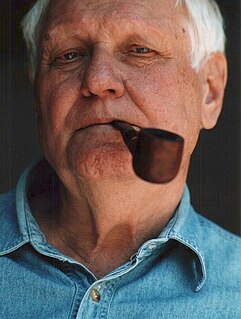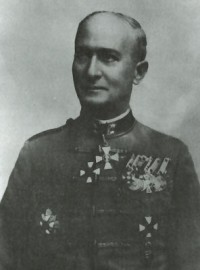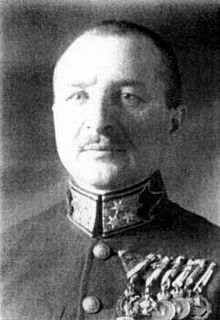 W
WZoltán Baló was a Hungarian military officer and a Colonel of the Royal Hungarian Home Defence Force and its successor, the Royal Hungarian Home Defence Force. He is best known for his help to Polish and French military refugees in Hungary during World War II.
 W
WMiklós Borz was a Hungarian soldier and politician, member of the National Assembly (MP) from FKGP Pest County Regional List between 1990 and 1992.
 W
WFerenc Csik was a Hungarian swimmer who competed in the 1936 Summer Olympics.
 W
WZoltán Decleva was a Hungarian military officer, who served as commander of the Hungarian Third Army during the Second World War.
 W
WLászló Deseő was a Hungarian military officer and diplomat, who served as artillery commander of the Hungarian Second Army's First Corps during the Second World War.
 W
WVitéz Ferenc Feketehalmy-Czeydner was a Hungarian military officer who had a significant role in the Novi Sad massacre during the Second World War.
 W
WLászló Ferenczy was a lieutenant colonel in the Hungarian Royal Gendarmerie and member of its "central dejewification unit" during World War II and the Holocaust.
 W
WErvin Y. Galantay was a Hungarian-American architect. He married to Karla Jay Noell in 1959. They had two sons Roy and Richard. He lived most of his life in Cossonay, Switzerland, where he was a Professor Emeritus at the Ecole Polytechnique Fédérale de Lausanne.
 W
WElemér Gorondy-Novák was a Hungarian military officer, who served as commander of the Hungarian Third Army during the Second World War.
 W
WGyula Grosics was a Hungarian football goalkeeper who played 86 times for the Hungary national football team and was part of the "Golden Team" of the 1950s. Regarded as one of the greatest goalkeepers of all time, he was thought to be the first goalkeeper to play as the sweeper-keeper. Grosics was nicknamed "Black Panther", because he wore black clothing while playing. He won a gold medal in football at the 1952 Summer Olympics.
 W
WJózsef Vitéz Heszlényi was a Hungarian General during World War II and commander of the 3rd Hungarian Army.
 W
WIván vitéz Hindy de Kishind or vitéz kishindi Hindy Iván was an officer in the Royal Hungarian Army during World War II.
 W
WIstván Horthy de Nagybánya was Hungarian regent Admiral Miklós Horthy's eldest son, a politician, and, during World War II, a fighter pilot.
 W
WMiklós Horthy de Nagybánya was a Hungarian admiral and statesman who served as the regent of the Kingdom of Hungary between the two World Wars and throughout most of World War II, from 1 March 1920 to 15 October 1944.
 W
WMiklós Jancsó was a Hungarian film director and screenwriter.
 W
WColonel General Vitéz Gusztáv Jány was a Hungarian officer during World War II who commanded the Hungarian Second Army at the Battle of Stalingrad. After the war, he was found guilty of war crimes and executed by firing squad. He was posthumously exonerated in 1993 by the Supreme Court of Hungary.
 W
WGyula Kádár was a Hungarian military officer who was the head of the Hungarian military intelligence from August 1943 until the occupation of Hungary by Nazi German forces during World War II.
 W
WSándor Képíró was a Hungarian gendarmerie captain during World War II accused of war crimes committed by Hungarian forces.
 W
WLajos Keresztes-Fischer was a Hungarian military officer, who served as Chief of the General Staff in 1938. His older brother was Ferenc Keresztes-Fischer, a politician and Minister of the Interior.
 W
WKálmán Kéri was a Hungarian military officer and politician.
 W
WDr. Béla Király was a Hungarian army officer before, during, and after World War II. After the war, he was sentenced to life in prison under the Soviet-allied regime, but was later released. After his release, he commanded the National Guard in the 1956 Hungarian Revolution. He then fled to the United States, where he became an academic historian. He returned to Hungary after the collapse of the Soviet Bloc and was elected a member of Hungarian Parliament.
 W
WSándor Kuti (1908–1945?) was a Hungarian Jewish composer. His "Serenade for string trio" and a solo violin sonata are featured on the 2008 Hungaroton album In Memoriam: Hungarian Composers, Victims Of The Holocaust.
 W
WGéza Lakatos de Csíkszentsimon was a colonel general in the Hungarian Army during World War II who served briefly as Prime Minister of Hungary, under governor Miklós Horthy from 29 August 1944, until 15 October 1944.
 W
WAndrás Littay was a Hungarian General during World War II. He was professor at the Budapest Military Academy and Commander of the VII Army Corps, the Deputy Minister of Defence, the Royal Hungarian Privy Councilor, a member of the Order of Vitéz.
 W
WJenő Major was a Hungarian military officer, who served as the last Commander of the Hungarian Second Army during the Second World War.
 W
WPál Maléter was the military leader of the 1956 Hungarian Revolution.
 W
WAmos Manor was Director of the Shin Bet, Israel's internal intelligence and security service, from 1953 until 1963.
 W
WBéla Miklós de Dálnok, Vitéz of Dálnok was a Hungarian military officer and politician who served as acting Prime Minister of Hungary, at first in opposition, and then officially, from 1944 to 1945. He was the last Prime Minister of war-time Hungary.
 W
WIstván Náday was a Hungarian military officer, who served as commander of the Hungarian First Army during the Second World War. He was appointed a pedestrian lieutenant at the Ludovika Academy in 1908, and served in the Red Army in the First World War. After the war, he was a military academy professor, and worked his way up to general, then eventually commander-in-chief.
 W
WVilmos Nagy de Nagybaczon was a commanding general of the Royal Hungarian Army (1920–1945), Minister of Defence, a military theorist and historian.
 W
WIstván Schweitzer (1887–1981) was a Hungarian military officer, who served as commander of the Hungarian First Army during the Second World War.
 W
WKároly Solymár was a Hungarian hurdler. He competed in the men's 110 metres hurdles at the 1912 Summer Olympics.
 W
WLouis Szathmary was a Hungarian-American chef, writer, and public personality. A pioneering force in the food service profession, he is best known for heading the Chicago restaurant The Bakery and writing the New York Times bestseller The Chef's Secret Cookbook. Szathmary's involvement with the early frozen food industry, his numerous cookbooks and articles and his persona established him as an icon in the culinary arts industry.
 W
WZoltán Szügyi was a Hungarian Officer during World War II. He was a recipient of the Knight's Cross of the Iron Cross of Nazi Germany.
 W
WLóránd Utassy de Uljak was a Hungarian general.
 W
WLajos Veress de Dálnok was a Hungarian military officer, who served as commander of the Hungarian Second Army during the Second World War.
 W
WJános Vörös was a Hungarian military officer and politician, who served as Minister of Defence in the unofficial Interim National Government which led by Béla Miklós. He fought in the First World War at the Eastern Front and the Italian Campaign. He was appointed as Chief of Army Staff on 19 March 1944, when the Nazis occupied Hungary. Later Vörös joined the Red Army which arrived at Hungary's eastern border.
 W
WCount Albert Wass de Szentegyed et Czege was a Hungarian nobleman, forest engineer, novelist, poet and member of the Wass de Czege family.
 W
WHenrik Werth was a Hungarian military officer, who served as Chief of Army Staff during World War II.
 W
WCharles Zentai, was a Hungarian-born resident of Australia accused of a Holocaust-related war crime. He resided in Perth, Western Australia for many years after living in the American- and French-occupied zones of post-World War II Germany.